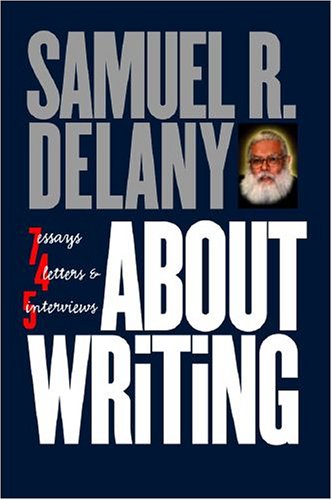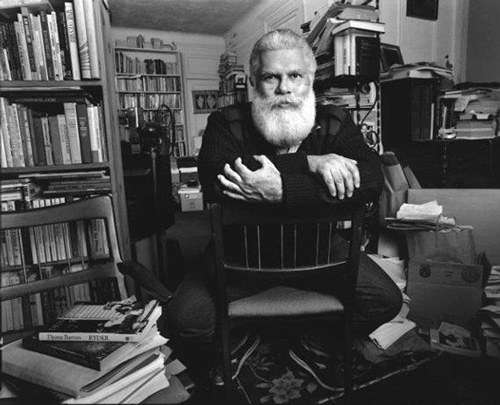link
Good Writing vs. Talented Writing
by Maria Popova
“Talented writing makes things happen in the reader’s mind — vividly, forcefully — that good writing, which stops with clarity and logic, doesn’t.”
 The secrets of good writing have been debatedagain and again and again. But “good writing” might, after all, be the wrong ideal to aim for. In About Writing: Seven Essays, Four Letters, and Five Interviews (public library), celebrated author and literary critic Samuel Delany — who, for a fascinating factlet, penned the controversial 1972 “women’s liberation” issue of Wonder Woman — synthesizes his most valuable insights from thirty-five years of teaching creative writing, a fine addition to beloved writers’ advice on writing. One of his key observations is the crucial difference between “good writing” and “talented writing,” the former being largely the product of technique (and we know from H.P. Lovecraft that “no aspiring author should content himself with a mere acquisition of technical rules”), the other a matter of linguistic and aesthetic sensitivity:
The secrets of good writing have been debatedagain and again and again. But “good writing” might, after all, be the wrong ideal to aim for. In About Writing: Seven Essays, Four Letters, and Five Interviews (public library), celebrated author and literary critic Samuel Delany — who, for a fascinating factlet, penned the controversial 1972 “women’s liberation” issue of Wonder Woman — synthesizes his most valuable insights from thirty-five years of teaching creative writing, a fine addition to beloved writers’ advice on writing. One of his key observations is the crucial difference between “good writing” and “talented writing,” the former being largely the product of technique (and we know from H.P. Lovecraft that “no aspiring author should content himself with a mere acquisition of technical rules”), the other a matter of linguistic and aesthetic sensitivity:Though they have things in common, good writing andtalented writing are not the same.[…]If you start with a confused, unclear, and badly written story, and apply the rules of good writing to it, you can probably turn it into a simple, logical, clearly written story. It will still not be a good one. The major fault of eighty-five to ninety-five percent of all fiction is that it is banal and dull.Now old stories can always be told with new language. You can even add new characters to them; you can use them to dramatize new ideas. But eventually even the new language, characters, and ideas lose their ability to invigorate.Either in content or in style, in subject matter or in rhetorical approach, fiction that is too much like other fiction is bad by definition. However paradoxical it sounds, good writing as a set of strictures (that is, when the writing is good and nothing more) produces most bad fiction. On one level or another, the realization of this is finally what turns most writers away from writing.Talented writing is, however, something else. You need talent to write fiction.Good writing is clear. Talented writing is energetic. Good writing avoids errors. Talented writing makes things happen in the reader’s mind — vividly, forcefully — that good writing, which stops with clarity and logic, doesn’t.
Virginia Wolf knew subtlety was the key to craftsmanship when she counseled that “we have to allow the sunken meanings to remain sunken, suggested, not stated.” “All bad writers are in love with the epic,” Hemingway admonished. The talented writer, Delany reminds us, is a master of induction, suggesting the general through the deft deployment of the specific, and in the process producing an even greater dramatic effect than the bombast of sweeping statements ever could:
The talented writer often uses specifics and avoids generalities — generalities that his or her specifics suggest. Because they are suggested, rather than stated, they may register with the reader far more forcefully than if they were articulated. Using specifics to imply generalities — whether they are general emotions we all know or ideas we have all vaguely sensed — is dramatic writing. A trickier proposition that takes just as much talent requires the writer carefully to arrange generalities for a page or five pages, followed by a specific that makes the generalities open up and take on new resonance. … Indeed, it might be called the opposite of “dramatic” writing, but it can be just as strong — if not, sometimes, stronger.
“Words have their own firmness,” Susan Sontag reflected in her diary. “Use the right word, not its second cousin,” Mark Twain famously advised, but great writing isn’t just a mere matter of concision. As E.B. White reminded us,“Writing is not an exercise in excision, it’s a journey into sound.” Delany bisociatesthis dual requirement for precision and eloquence, with precision and eloquence:
The talented writer often uses rhetorically interesting, musical, or lyrical phrases that are briefer than the pedestrian way of saying “the same thing.”The talented writer can explode, as with a verbal microscope, some fleeting sensation or action, tease out insights, and describe subsensations that we all recognize, even if we have rarely considered them before; that is, he or she describes them at greater length and tells more about them than other writers.In complex sentences with multiple clauses that relate in complex ways, the talented writer will organize those clauses in the chronological order in which the referents occur, despite the logical relation grammar imposes.
In fact, the true potency of “talented writing,” Delany suggests, lies in its ability to compress subtle yet all-consuming sensation into an enormously efficient information packet. In many ways, the talented writer possesses the same qualities Wordsworth ascribed to the poet when he described him as someone “endowed with more lively sensibility, more enthusiasm and tenderness, who has a greater knowledge of human nature, and a more comprehensive soul, than are supposed to be common among mankind.” Delany concludes:
Talented writing tends to contain more information, sentence for sentence, clause for clause, than merely good writing. … It also employs rhetorical parallels and differences. . . . It pays attention to the sounds and rhythms of its sentences. . . . Much of the information it proffers is implied. … These are among the things that indicate talent.
About Writing: Seven Essays, Four Letters, and Five Interviews goes on to explore such facets of the craft as character and plot development, the intricacies of “pure storytelling,” and how to manage creative doubt.

No comments:
Post a Comment